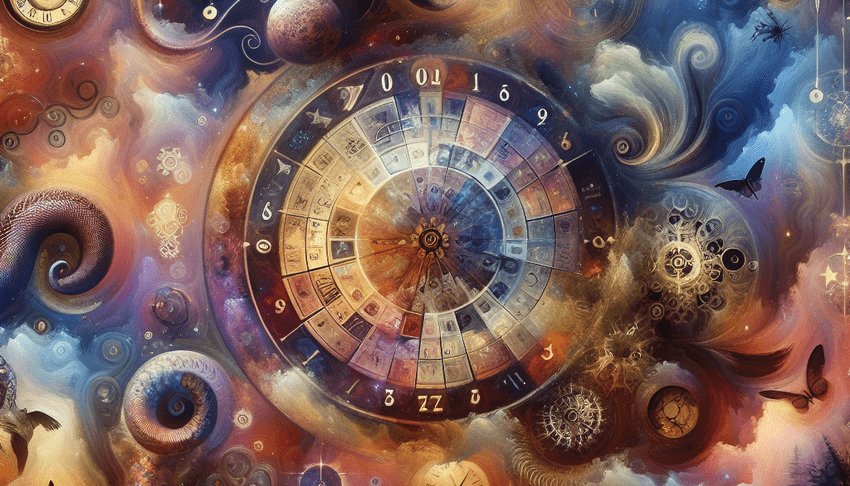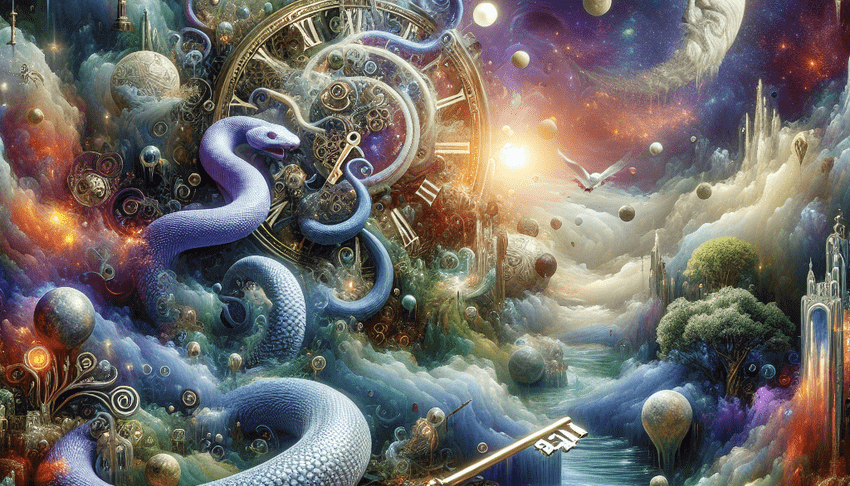Table of Contents
Unveiling the Shadow Self through Dream Analysis

Dreams as a Gateway to the Unconscious
Dream interpretation has long been a subject that fascinates both the scientific community and the general public alike. At the heart of this intrigue is the notion that our dreams are a window into the uncharted territory of our unconscious mind. Jungian psychology, pioneered by the Swiss psychiatrist Carl Gustav Jung, places particular emphasis on the transformative power of engaging with our dreams to gain insights into our inner world.
Understanding the Unconscious Through Dreams
Jungian psychology posits that the unconscious consists of the personal unconscious, which is unique to each individual, and the collective unconscious, a repository of shared human experiences and archetypes. Dreams, according to Jung, are the language through which our unconscious communicates with our conscious mind. By interpreting dreams, we begin to decode messages that can shine a light on shadow selves in dreams, those repressed or ignored parts of our personality.
Shadow selves in dreams may manifest as characters or symbols that represent aspects of ourselves we are not fully aware of or don’t readily accept. Engaging with the shadow through dream interpretation is a transformative process, possibly leading to greater psychological integration and wholeness.
Deciphering Shadow Selves in Dreams
Interpreting shadow selves in dreams can often be challenging, as these aspects are adept at eluding our conscious awareness. Jungian psychology provides tools and frameworks to analyze these complex symbols and themes, with the aim of reconciling these hidden facets with our conscious self.
- Characters in dreams who elicit a strong, often negative emotional response could be reflections of parts of ourselves we are yet to confront.
- Recurring themes or patterns may signal unresolved inner conflicts or fears.
- Confronting fears or embracing qualities represented by the shadow in dreams can lead to profound personal growth and transformation.
Utilizing real-life examples adds a practical dimension to the theory. Imagine someone who dreams of a dismissive or arrogant colleague. In waking life, this person might pride themselves on humility and cooperation. Upon closer analysis, this antagonistic figure in the dream might represent the dreamer’s own unacknowledged need for recognition and influence, aspects they may consider negative but which require acknowledgment and integration for true self-awareness.
Embracing the Hidden Self
The journey of integrating the shadow through dream analysis is not a linear one, nor is it void of discomfort. However, the outcomes often lead to the cultivation of Emotional Intelligence, grounded self-esteem, and a nuanced understanding of one’s motivations and desires. As we grapple with the shadow selves in dreams, Jungian psychology stands as an ally, offering methods to interpret these enigmatic messages and thereby enriching our journey of self-discovery and personal development.
Interpreting Shadow Symbols in Dreams
Interpreting dreams is an enthralling pursuit that often leads us to the most secluded corners of our psyche. Among the rich tapestry of symbols that our subconscious mind weaves every night, those pertaining to our ‘Shadow selves’ are possibly the most mysterious and enlightening. In Jungian psychology, the ‘Shadow’ represents the part of ourselves we are unaware of or choose to ignore. By interpreting shadow selves in dreams, we gain the opportunity to acknowledge and integrate these hidden aspects into our conscious life.
In our dreams, the Shadow may manifest as dark figures, unknown entities, or even animals that stir a sense of dread or discomfort. These are the messengers of the parts of ourselves that we have denied or suppressed. For instance, dreaming of a menacing stranger might reflect unacknowledged feelings of aggression or fear that one has stifled in waking life. The challenge lies in recognizing that this stranger is not an external threat, but a symbol of our own repressed emotions or traits.
Real-life Implications of Shadow Encounters in Dreams
People from various cultures report encounters with shadowy figures in their dreams. A professional who constantly dreams of being chased by an indistinct assailant might be subconsciously fleeing from their own assertiveness, which perhaps feels threatening due to a non-confrontational upbringing. Likewise, a nurturing individual encountering ferocious animals in dreams may be grappling with their own neglected need for self-care or more primal instincts they have been taught to suppress.
The importance of Emotional Intelligence in these scenarios cannot be understated. High Emotional Intelligence allows us to navigate the complex feelings these dreams evoke and facilitates the process of understanding and integrating the Shadow. It takes courage and self-awareness to delve into the symbolism of our dreams and to confront the truths they reveal about our inner world.
- Identifying Personal Shadow Symbols
- Considering Cultural Influences on Symbol Interpretation
- Linking Dream Symbolism to Conscious Emotion
We can make huge strides in personal growth by working to understand the unique symbols our subconscious chooses to represent the Shadow. A dream journal could be instrumental in this pursuit, allowing one to track recurring themes or figures that could hold significance. Pair this practice with an analysis of our emotional reactions to these symbols, and the path to understanding our Shadow becomes much clearer.
Interpreting shadow selves in dreams involves a blend of self-reflection, a deep dive into personal emotions, and a contextual understanding of our cultural background. Through this intricate process, we unearth the buried treasures of self-knowledge that empower us to lead more well-rounded, aware lives. Addressing the Shadow in dreams is not just about decoding symbols—it’s about embracing the full spectrum of our being, the illuminated and the obscure alike.
Engaging with the Shadow for Personal Growth

Engaging with the Shadow for Personal Growth
In the realm of dream interpretation and symbolism, an intriguing facet of our nocturnal narratives often skirts the edges of our understanding—our shadow selves. Recognizing and integrating these shadow aspects can lead to profound personal growth and a richer understanding of ourselves. But what exactly is our “shadow,” and how can dreams act as a portal to unearth these hidden parts of our psyche?
Our shadow, a term coined by the famed psychiatrist Carl Gustav Jung, represents the parts of ourselves we may not readily acknowledge—traits we deem undesirable or incompatible with our conscious identity. Jungian psychology suggests that engaging with our shadow selves in dreams is pivotal for achieving psychological wholeness. Interpreting shadow selves in dreams involves recognizing and reconciling with these aspects rather than dismissing or avoiding them.
So, how do we confront and integrate the shadow through dream work? The process typically encompasses a few critical steps:
- Record and reflect on your dreams, focusing on emotions and unfamiliar characters that might symbolize your shadow.
- Explore the context around shadow figures or themes in your waking life to uncover underlying issues.
- Embrace the process of active imagination—engage with your shadow aspects in a safe, meditative state to understand them better.
Case Studies on Shadow Integration
Cases in point often involve people facing recurring dreams fraught with anxiety or conflict. One example involves a man repeatedly dreaming of being pursued by an intimidating figure. Through therapy, he realized this figure represented qualities he secretly envied but suppressed, such as assertiveness and the capacity for leadership. By interpreting shadow selves in dreams like this, he could acknowledge and learn from these qualities, integrating them into his waking persona.
Another individual dreamt of a scornful figure, which, upon analysis, revealed her tendency toward self-criticism and perfectionism. Acknowledging this allowed her to confront her inner critic and foster Self-compassion.
Integrating our shadow selves is not about eradicating them but rather bringing balance between varied elements of our personality. It means accepting the full spectrum of our being, both light and dark. This acknowledgment does not condone negative behaviors but rather provides a springboard from which we can grow and improve.
By turning our attention to the messages delivered through our dreams and interpreting the shadow selves therein, we embark on a journey towards greater self-awareness. This path, while challenging, traverses the landscape of our internal lives and offers enlightenment that reinforces our Emotionale Intelligenz.
In the continuous exploration of our inner selves, dreams are not just ephemeral night-time escapades; they are a conduit for healing and self-awareness. When we recognize the shadow figures that dance in our dreams, we take essential strides towards integrating all parts of our being, ultimately fostering a more profound sense of identity and authenticity in our waking lives.
Dream Interpretation and the Enhancement of Emotional Intelligence
In the fascinating realm of dream interpretation, we often encounter the enigmatic figures of our Shadow selves, a concept deeply rooted in Jungian psychology. The process of interpreting Shadow selves in dreams is not just an abstract exercise; it unveils profound layers of our personality that could significantly enhance our Emotional Intelligence.
Shadow Selves: A Hidden Glimpse into Inner Conflicts
At first glance, the Shadow might appear as a villain in our dreams—an embodiment of everything we refuse to acknowledge about ourselves. Yet, Jungian psychology encourages us to see the Shadow not as an adversary, but rather as a vital aspect of our subconscious that reveals hidden passions, fears, and potentials. By interpreting shadow selves in dreams, we unlock an intimate dialogue between our conscious and unconscious realms, offering a clearer understanding of our internal conflicts and emotional barriers.
- Exposing subconscious biases and preconceptions
- Highlighting personal vulnerabilities and strengths
- Uncovering suppressed emotions and desires
Building Blocks of Emotional Intelligence
Emotional Intelligence is a dynamic mosaic consisting of self-awareness, empathy, self-regulation, motivation, and social skills. When we interpret dreams, especially those involving the Shadow, we often encounter emotions that may be difficult to confront when awake. These nocturnal narratives offer safe spaces to rehearse and understand complex emotions without real-world repercussions. This understanding fosters Emotional Intelligence by:
- Enriching self-perception through a deeper emotional understanding
- Expanding empathy by recognizing shared human experiences in our dreamscapes
- Improving relationship management via insights on interpersonal dynamics exposed in dreams
Dream Interpretation: The Silent Emotional Educator
In our fast-paced world, introspection is a luxury that dream interpretation naturally provides. The emotions stirred by dreams often resonate beyond the boundaries of sleep, manifesting in our waking life as improved intuition and a keener perception of others’ emotional states. The journey of interpreting shadow selves in dreams can thus dramatically improve our Emotional Intelligence, making us more adept at navigating our internal emotional world and the complex web of relationships that define our social existence.
To illustrate, consider the emotional insights gleaned from a dream where confrontation with a Shadow self led to profound personal revelations about unresolved anger towards a loved one. Once awake, the dreamer may resolve to approach the relationship with newfound understanding and patience, thereby enhancing their Emotional Intelligence and the quality of their personal connections.
In conclusion, the union of dream interpretation and Emotional Intelligence forms a symbiotic relationship enriching both our self-awareness and our social interactions. Dreams, with their rich symbolism and emotional depth, serve as a reflection of our innermost selves and, if interpreted with care, can become powerful catalysts for emotional growth and transformation.
Summary
Dreams have captivated scientists and the public alike, revealing pathways into the unconscious. Central to understanding this realm is the concept of “Shadow Selves,” as introduced by Carl Jung. This profound element of dream interpretation helps us explore hidden facets of our personality.
Engaging with the Shadow
Jungian psychology informs us that our Shadow represents traits we may not consciously acknowledge. Dreams offer a unique means of connecting with these repressed aspects. Engaging with and interpreting our Shadow Selves in dreams can lead to invaluable insights and contribute to our emotional and mental wholeness.
- Dream characters who provoke strong reactions may reflect personal traits we struggle to accept.
- Repeating themes could point to unresolved conflicts or fears requiring attention.
- Addressing our fears or embracing traits symbolized by the Shadow can prompt significant growth.
Consider a dream featuring a dismissive colleague; this may represent the dreamer’s unrecognized desire for acknowledgment, pushing for a more integrated self-awareness.
Symbols and Practical Insights
Dreams are rich with symbols, from animals portraying instinctual behaviors to mysterious figures symbolizing unknown parts of ourselves. For instance, encountering a dark, shadowy figure may not only point to fears but can also signify untapped potential.
- A wild animal might represent suppressed aggression or other primal urges.
- Unknown entities could embody traits you find disturbing but need to confront.
- Dark places, like basements, may suggest an avoidance of deep-seated emotions.
These symbols may reveal latent strengths such as dormant talents or virtues, akin to a dream of flying reflecting hidden ambitions.
Integrating the Shadow for Emotional Growth
Confronting our Shadow Selves in dreams can empower us, fostering a balanced life and enhancing Emotional Intelligence. Analyzing these aspects might also reveal new capacities for leadership or creativity, underscoring the practical benefits of dream interpretation.
Emotional Intelligence shapes our self-awareness, empathy, and social interactions. Dream interpretation aids in the development of Emotional Intelligence by providing a space to reconcile with complex emotions.
- Enhancing self-awareness by exploring our deepest feelings.
- Expanding empathy through common human experiences within dreams.
- Understanding interpersonal dynamics to improve relationships.
In summary, engaging with our Shadow Selves through dream interpretation is not just enlightening; it’s transformative. As we navigate the symbolism and emotional undercurrents of our dreams, we reveal the narrative of our internal lives, thus enhancing our Emotional Intelligence and personal development.
FAQ – Exploring Shadow Selves in Dreams
How can analyzing dream symbols help in uncovering and understanding the shadow self, as described in Jungian psychology?
Analyzing dream symbols allows individuals to peer into the subconscious realm where the shadow self resides, a concept in Jungian psychology that embodies our repressed ideas, instincts, and aspects of our personality that we consider negative. Through understanding the symbolic language of dreams, we can unveil these hidden parts, bringing them into consciousness which can lead to personal growth and a more integrated self. This process of recognition and integration can foster profound insights and facilitate a journey towards holistic psychological health.
What role does dream interpretation play in understanding and exploring the Jungian concept of the shadow self?
Dream interpretation serves as a vital gateway into the Jungian realm of the shadow self, a hidden part of our psyche that houses repressed ideas and instincts. By analyzing the symbolic language of dreams, we can shine light on these obscured aspects, facilitating a dialogue between our conscious and unconscious minds. This process not only aids in embracing our full personality but also promotes psychological growth and self-awareness.
How can dream interpretation help in uncovering and comprehending the Jungian concept of the shadow self?
Dream interpretation serves as a reflective conduit revealing the Jungian shadow self, the unacknowledged and often subconscious facets of our personality. By analyzing recurring motifs and confronting emotionally charged symbols in our dreams, we manifest the hidden aspects of our psyche and provoke a dialogue that facilitates self-awareness. This process aids in integrating these shadow facets into our conscious being, leading to a more whole and balanced self.




